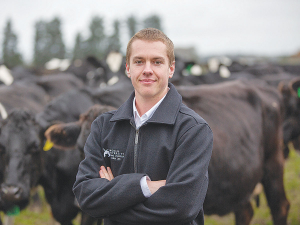Seminar on improving dispute resolution
A seminar on rural dispute resolution has been organised at Lincoln University, Christchurch this month.
 Cameron Marshall's research is showing promising results of using an animal-based solution to N leaching.
Cameron Marshall's research is showing promising results of using an animal-based solution to N leaching.
New Lincoln University pastoral livestock production lab research is defining how to get the maximum benefit from cows predisposed to urinate nitrogen (N), resulting in less leaching to waterways.
PhD student Cameron Marshall has just published two new articles in top scientific journals as part of his doctoral thesis, showing that what cows with phenotypically lower milk urea N eat, and how they eat, is important to their environmental impact.
He says inefficient N use from pastoral dairy production systems has resulted in concern regarding environmental degradation "and cows are demonised for it".
"This is a result of excessive urinary N leaching into waterways and nitrous oxide emissions from urination patches into the atmosphere. Dairy cows are demonised for it, but can be part of the solution too," he said.
His first paper reports that cows with low milk urea N concentrations eating plantain rather than a ryegrass diet, urinate significantly less N excretion per urination event, thus reducing the potential N leaching to waterways.
The second paper found that the grazing and ruminating behaviour of cows selected for divergent milk urea N, masticate, and ruminate the pasture they eat differently, which determines their rumen function and the efficiency of N digestion and use in the rumen.
This alters the N excretion patters to the environment. Cameron's previous research has already shown that cows selected for low milk urea N had a 28% reduction in the urinary urea N loading rate per urine patch than cows with higher milk urea N breeding values.
Those 'better cows' also yielding an increase in milk protein percentage.
"The results of this new research indicate two promising tools that temperate pastoral dairy production systems can use to reduce N losses and ameliorate the negative impact on the environment."
Cameron's research is showing promising results of using an animal-based solution in conjunction with dietary management strategies to reduce the environmental impact from dairy farms in New Zealand.
Chew On This
During this study cows divergent for milk urea N breeding values (MUNBV) exhibited different grazing patterns and oral processing of ingesta and digesta through differentiated mastication and chewing rates, respectively.
A greater number of mastications and chews in low MUNBV animals may result in a steadier inflow of more fermentable ingesta and digesta to the rumen, respectively.
This in turn may add to and help explain differential rumen function and nutrient supply to the host animal, which could help elucidate different observations in phenotypes previously reported for grazing dairy cows divergent for MUNBV.
Bankers have been making record profits in the last few years, but those aren’t the only records they’ve been breaking, says Federated Farmers vice president Richard McIntyre.
The 2023-24 season has been a roller coaster ride for Waikato dairy farmers, according to Federated Farmers dairy section chair, Mathew Zonderop.
Ministry for Primary Industries (MPI) director general Ray Smith says job cuts announced this morning will not impact the way the Ministry is organised or merge business units.
Scales Corporation is acquiring a number of orchard assets from Bostock Group.
Family and solidarity shone through at the 75 years of Ferdon sale in Otorohanga last month.
The Ministry for Primary Industries (MPI) has informed staff it will cut 391 jobs following a consultation period.
OPINION: Scientists claim to have found a new way to make a substitute for cow's milk that could have a…
OPINION: The Irish have come up with a novel way to measure cow belching, which is said to account for…